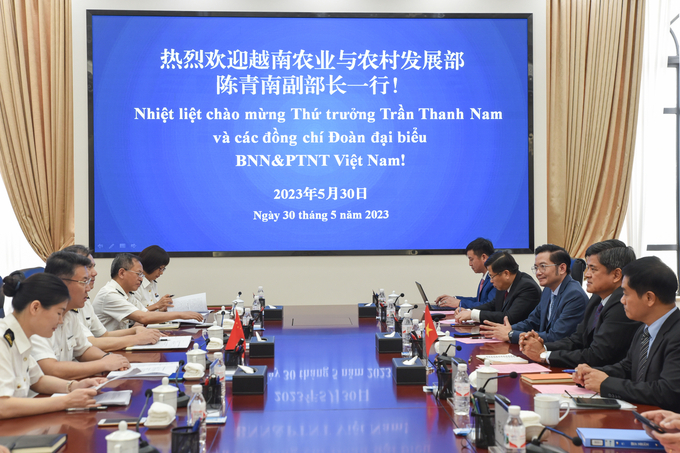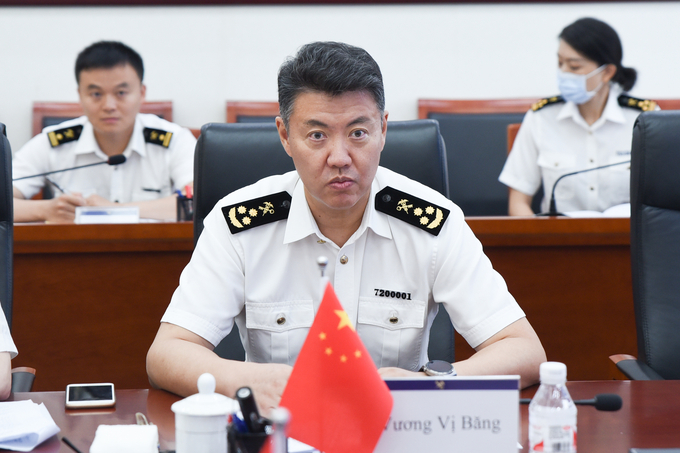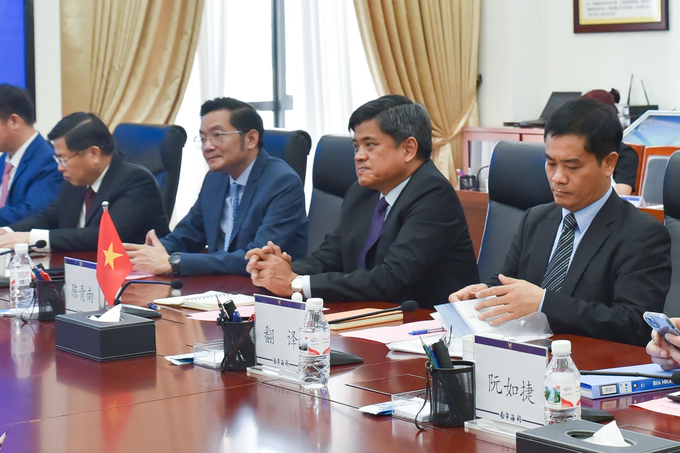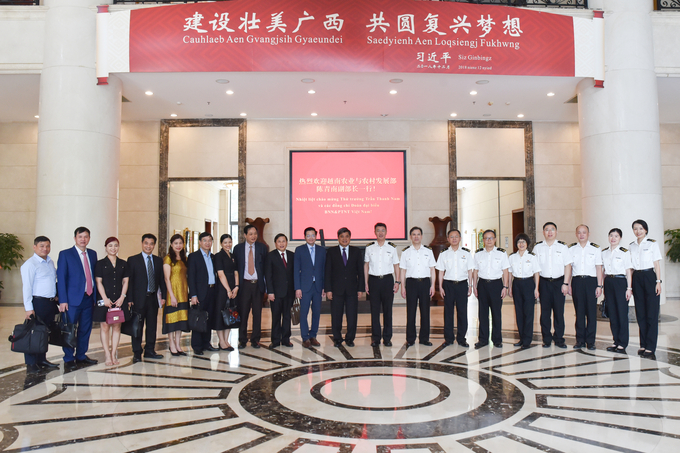May 24, 2025 | 12:44 GMT +7
May 24, 2025 | 12:44 GMT +7
Hotline: 0913.378.918
May 24, 2025 | 12:44 GMT +7
Hotline: 0913.378.918

The meeting between the Ministry of Agriculture and Rural Development of Vietnam and the Nanning's Department of Customs, General Administration of Customs of China in Guangxi, on May 30. Photo: Cao Tran.
Mr. Vuong Vi Bang, Director of Nanning Customs Department expressed the pleasure of welcoming Deputy Minister Tran Thanh Nam and the Ministry of Agriculture and Rural Development of Vietnam to Nanning's Department of Customs. Mr. Vuong also thanked the Ministry of Agriculture and Rural Development for the growing cooperative partnership between the two parties in recent years.
Deputy Minister Tran Thanh Nam stated that the two parties have not had the opportunity to hold direct conversations regarding agricultural issues. According to the Deputy Minister, the Nanning's Department of Customs is a multi-functional unit, with multiple departments in charge of animal and plant quarantine, and food safety.
Deputy Minister Tran Thanh Nam highlighted opportunities to promote cooperation in the supervision and inspection of agricultural products in the near future.
According to Deputy Minister Tran Thanh Nam, the General Secretary of the two countries met in October 2022 with the goal of promoting the traditional cooperative relations across various fields. This event has encouraged Vietnam's agricultural sector to meet with the Guangxi provincial government as well as the Nanning's Department of Customs. Accordingly, the Ministry of Agriculture and Rural Development of Vietnam wanted to discuss solutions to promote agricultural trade after the Covid-19 pandemic, which greatly affected the supply chain of agricultural products between Vietnam and China.
According to Mr. Vuong Vi Bang, the year 2023 marks the 15th anniversary of the comprehensive strategic cooperation partnership between Vietnam and China. During this period, high-level exchanges between the two countries have become increasingly comprehensive, mutual political trust has continued to be strengthened, and cooperation in economy and trade has developed effectively.
Mr. Vuong affirmed that the Nanning's Department of Customs will further promote cooperation between the two parties, including cooperation with the Ministry of Agriculture and Rural Development of Vietnam. Regarding the trade of agricultural products, Nanning's Department of Customs places a high priority on the issue of quarantine and accelerating the customs clearance procedure.
The General Administration of Customs of China reported that in 2022, the border gates of Guangxi province have imported the most Vietnamese agricultural products among provinces sharing borders with Vietnam. Namely, the turnover reached 5.85 billion yuan, which is an increase of 86.4% compared to 2021, accounting for 14.5% of the total number of Vietnamese agricultural products imported into China.
“During the first four months of 2023, the border gates of Guangxi province imported 2.49 billion yuan of Vietnamese agricultural products, which is an increase of 44.7% over the same period in 2022. This figure accounted for 19.7% of the total number of Vietnamese agricultural products imported into China", reported the Director of Nanning's Department of Customs.
These figures demonstrated a strong growth in agricultural trade between China and Vietnam, with Guangxi province as the largest gateway to China's agricultural imports.
Customs clearance at border gates has been overloaded due to the present durian and mango peak season. However, thanks to the efforts of both governments, the pace of goods going through customs remains consistent.
Both parties had to increase their human resources in order to facilitate customs clearance during peak season. As a result, Mr. Vuong expressed his wish to promote deeper cooperation and improve customs clearance capacity for border gates.

Mr. Vuong Vi Bang, Director of Nanning's Department of Customs made 3 proposals to the Ministry of Agriculture and Rural Development of Vietnam. Photo: Cao Tran.
Accordingly, Director Vuong Vi Bang made 3 proposals to Deputy Minister Tran Thanh Nam. Firstly, the two parties should continue to strengthen exchanges and establish a closer cooperative partnership.
Secondly, strengthen research to put the smart border gate system into pilot operation. The Chinese government has proposed to establish a smart customs system whereas the Vietnamese government has recently launched a digital border gate system, both of which share several fundamental similarities.
Thirdly, facilitate trade in agricultural products and promote the development of Vietnam - China trade. "Vietnam and China have excellent potential for cooperation in agricultural trade", remarked Mr. Vuong Vi Bang.
In response to comments from the Nanning's Department of Customs, Deputy Minister Tran Thanh Nam affirmed that the Ministry is in high agreement with the proposals made by Mr. Vuong Vi Bang.
Additionally, Deputy Minister Tran Thanh Nam raised several proposals for Nanning's Department of Customs. He suggested that there should be further information exchange between units at the border gate to facilitate customs clearance during peak seasons.
“There are several issues that both countries must address face-to-face, such as the standards for importing and exporting agricultural products, customs clearance mechanism, QR codes issuance to control the quantity of goods, and policies for cooperation between the two parties", Deputy Minister Tran Thanh Nam commented.
According to Deputy Minister Tran Thanh Nam, there are gaps in the current systems and regulations that bad actors can exploit. Namely, there have been reports of false certificates or purposeful misrepresentation of product quantity.
In addition, Deputy Minister Tran Thanh Nam highlighted the issue of early clearance priority because certain types of agricultural products have a shorter shelf life. As a result, long customs clearance time can degrade their quality.
The province of Guangxi regularly sees high traffic in goods. As a result, the customs clearance process at these border gates are under a lot of pressure. The Deputy Minister suggested establishing a contact point so that the Nanning's Department of Customs and the Ministry of Agriculture and Rural Development could connect without relying on text-based exchange.
Moreover, Guangxi shares a border with four Vietnam's provinces with nine pairs of border gates. However, only six of these are allowed to import and export vegetables. Deputy Minister Tran Thanh Nam proposed the Nanning's Department of Customs to consider expanding the scale of import and export to all nine pairs of border gates. This expansion can reduce the pressure on traditional border gates, prevent traffic congestion and reduce costs.

Deputy Minister of Agriculture and Rural Development Tran Thanh Nam made several suggestions to promote trade of agricultural products between Vietnam and Guangxi. Photo: Cao Tran.
Deputy Minister Tran Thanh Nam expressed his approval of the digital border gates and smart customs policies. However, he suggested Nanning's Department of Customs to develop a detailed plan because several departments outside of the Ministry of Agriculture and Rural Development have been working similar projects.
"I believe that modern, smart and sustainable goals are global trends, so we should build a smart border gate system in the near future", said Deputy Minister Tran Thanh Nam.
Mr. Tran Thanh Nam also proposed the idea of establishing the Vietnam - Guangxi Agricultural Business Association. Accordingly, businesses from both countries with import and export needs can connect and cooperate through this Association.
Vietnam and China currently have an urgent the need for cooperation between agricultural businesses, especially during harvest seasons such as the current lychee season in Bac Giang and Hai Duong. The establishment of an association will help both governments connect with businesses to provide guidance and support in an effort to boost import and export turnover.

The Ministry of Agriculture and Rural Development of Vietnam and the Nanning's Department of Customs taking a commemorative photo after the meeting. Photo: Cao Tran.
Deputy Minister Tran Thanh Nam also proposed the establishment of Vietnam - China business linkage in the field of logistics. Namely, he suggested a regulated cold chain to handle the import and export of agricultural products that would guarantee quality at a lower cost.
Additionally, Deputy Minister Tran Thanh Nam proposed constructing cold storages or slaughtering centers for cattle and poultry in the border areas to meet the consumption needs, especially during peak seasons.
“Vietnam currently has many disease-free livestock zones. Multiple businesses have made substantial investments in livestock production chains and export to markets such as Japan, Korea, Russia, etc. I will propose to the Ministry of Agriculture and the General Administration of Customs of China to promptly open the door for Vietnamese livestock products", added Deputy Minister Tran Thanh Nam.
On the other hand, Deputy Minister Nam emphasized on the trade in seafood products. Both countries have high demand for seafood but the agreement on food safety control regarding seafood products is approaching its expiration date of September 2023. As a result, he recommended the Chinese government to sign a new protocol on the import and export of seafood products and live aquatic species between Vietnam and China.
In addition, the Ministry of Agriculture and Rural Development proposed the Nanning's Department of Customs to consider expanding the approved list of seafood products and live aquatic species for import and export between Vietnam and China.
Translated by Nguyen Hai Long

(VAN) The People's Committee of Tra Vinh province has approved an adjustment to the investment policy for the Green Hydrogen Plant project, increasing its area to approximately 52.76 hectares.
![Reducing emissions from rice fields: [2] Farmers’ commitment to the soil](https://t.ex-cdn.com/nongnghiepmoitruong.vn/608w/files/news/2025/05/05/dsc08881jpg-nongnghiep-140632.jpg)
(VAN) Clean rice cultivation model in Thuong Tan commune, Bac Tan Uyen district, is assisting local residents in achieving sustainable agriculture by substantially reducing costs, increasing productivity, and protecting the environment.

(VAN) At the conference to disseminate Resolution No. 68, AgriS introduced its digital agricultural ecosystem and reaffirmed its commitment to accompanying the Government in promoting private sector development and sustainable agriculture.

(VAN) 'Blue Ocean - Blue Foods' initiative is designed to restore marine ecosystems and establish sustainable livelihoods for local communities by cultivating a minimum of 1,000 hectares of cottonii seaweed in the first three years.
/2025/05/21/4642-3-112707_603.jpg)
(VAN) The V-SCOPE project has made direct contributions to three out of six pillars of the Comprehensive Strategic Partnership between Vietnam and Australia.

(VAN) Facing the threat of rabies spreading to the community, Gia Lai province urgently carries out measures to vaccinate dogs and cats on a large scale.

(VAN) Disease-free livestock farming not only protects livestock herds but also stabilizes production and livelihoods for many farmers in Tuyen Quang.